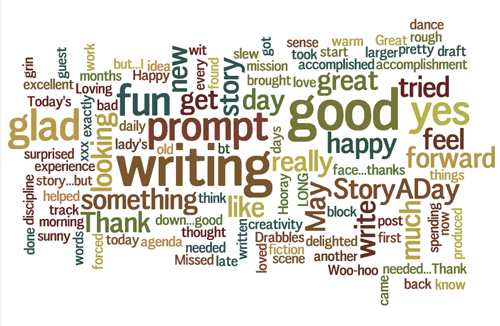What strikes me about this, is how often the words “fun”, “happy”, “yes!”, “accomplished” and “glad” come up in people’s comments about the StoryADay challenge.
It’s not to late to join in. Just pick up a pen, and off you go! You won’t regret it!

“I have a slew of new things to write that I wouldn’t have thought of if I hadn’t tried StoryADay, so this is pretty great.”
-k.c.
“I’m very much looking forward to spending May with you again! Should be great!”
-s.c.
“I’m so glad I found out about this. Thank you xxx”
-l*
“Great post, exactly what I needed…Thank you!”
-l.n.
“I have surprised myself wit the creativity I have produced.”
-m.r.
“I have been looking forward to May for months, now I know why! I love having a new writing experience every day,”
-c.l.
“Haven’t written fiction IN A LONG WHILE, and I’m glad I came up with something!”
-y*
“Today’s prompt really helped me get over a block for a scene I needed for a larger work I am writing.”
-c.jr.
“I like being forced to get something down…good daily discipline.”
c.g.
“mission accomplished!”
-k.d.
“I loved this – brought a delighted grin to an old lady’s face…thanks for a good start to a sunny morning.”
-a.r.
“the guest prompt was excellent.”
-m.s.
“…only 706 words, bt I like where that prompt took me.”
-e*
“Hooray! I’m having such fun with Drabbles.”
-c.k.
“It’s late in the day, but I got a story done so I’m happy. I feel a sense of accomplishment…”
c.g.
“yes yes yes. I did it. Woo-hoo!”
-k.m.
“…a good warm up for the other writing on the agenda today.”
-s*
“glad I tried it…”
-s.j.b.
“…not bad for a first draft, I think!”
-s.j.m.
“I’m not really happy with [this] story…but it was fun to write.”
-c.s.
“Thank you for another good story idea,”
-s.c.
“Very rough, but…I feel good about writing it.”
-r.s.
“So much fun.”
-s.c.
“Missed a few days, but I’m back on track!”
-m.l.
“Loving StoryADay!”
-k.l.
“Happy dance !!!!!!”
-b.o.
Special thanks to all the people who are writing, providing feedback, supporting each other and inspiring me to keep writing!


